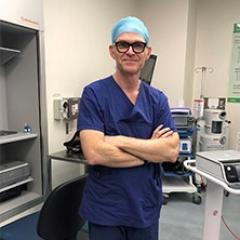About
The Surgical Oncology Group has long standing interests in the management of oesophageal, gastric and pancreatic cancer, melanoma and soft tissue tumours.
Melanoma in particular has seen significant changes in management over the last decade with much needed improvements in survival. Our research group is involved in studies which seek to further improve patient outcomes. Genomics have underpinned major advances in our understanding of oesophageal, gastric and pancreatic cancers.
Incorporation of genomics into clinical practice is a necessary next step for precision cancer care.
The Surgical Oncology Group's research encompasses:
- Clinical research, including randomised controlled clinical trials
- Laboratory based research, including molecular biology
- Translational research integrating the laboratory and clinical domains, including radiomics
- Clinical practice guidelines.
Improved clinical practice through clinical trials
Professor Barbour is the principal investigator for a response-based pre-operative therapy trial in oesophageal cancer (the "DOCTOR" study, NHMRC APP011782). The DOCTOR trial is multicentre clinical trial and includes a genomic study (APP1139071). In addition, the clinical research program has been focused on outcome studies and quality of life using our prospective database of over 1000 patients with oesophageal cancer.
Professor Barbour is also the principal investigator for the phase II peri-operative chemotherapy trial for pancreas cancer through the "GAP" study. The GAP study has led to the successful development of the MASTERPLAN trial, funded by MRFF, of chemotherapy and stereotactic radiation therapy in borderline and locally advanced pancreatic cancer (CIE Barbour).
In addition, Professor Barbour was the site investigator for the International Cancer Genome Consortium pancreatic cancer study at the Princess Alexandra Hospital and Greenslopes Private Hospital and this work has led to several publications in the Nature journal.
Laboratory based research
Professor Barbour’s research has focused on using genomic, epigenomic, mRNA expression and next generation sequencing data to classify oesophageal adenocarcinoma, pancreatic cancer and melanoma and to identify biomarkers of outcome.
The Surgical Oncology Group maintains the Cancer Evolution Biobank which encompasses 4 tissue collections:
- Oesophageal and gastric cancers
- Melanoma and soft tissue cancers
- Pancreatic cancer
- Healthy donor collection
This biobank facilitates active collaborations across Queensland including: Mater Research, QIMR, UQ, and Metro South Hospitals.
Translational research
Our group has actively worked towards improving cancer staging in Australia.
Professor Barbour was a member of the working party for the Cancer Council Clinical Practice Guidelines for the Management of Cutaneous Melanoma, the chapters on Sentinel Node Biopsy, the Use of Investigations and Follow Up. The guidelines are completed and published.
Melanoma
- Radiomics analysis to improve outcomes for melanoma patients
- Improving outcomes for patients with melanoma brain metastases
- Blood biomarkers to predict recurrence in BRAF-negative melanoma patients
Oesophageal adenocarcinoma
- Assessment of tumour phenotype for precision medicine in oesophageal cancer via deep learning analysis of medical images
- Understanding predisposition to Oesophageal Adenocarcinoma through defects in DNA damage repair genes
- Tumour evolution to improve precision medicine in patients with oesophageal adenocarcinoma
- Tumour neo-antigen-specific immune responses in oesophageal cancer long term survivors
- ctDNA: Towards biomarkers of progression and prognosis in Oesophageal Cancer
Pancreatic cancer
- Tissue biomarker in Pancreatic cancer
Organoid project
We are interested in developing new and targeted therapies for various cancers using patient-derived organoids (PDOs). These PDOs more closely resemble in vivo tumour characteristics and cell diversity compared with traditional 2D adherent cell monocultures, providing a more accurate model for the discovery of novel therapeutics. Most importantly, they retain patients’ genetic variability, enabling rapid in vitro screening of drug libraries to inform patient-specific and effective treatments. We screen both existing clinical and non-clinical drugs as well as novel drugs to evaluate their synergistic potential in effectively targeting tumour PDOs.
In the last five years we have received funding from:
Assessment of tumour phenotype for precision medicine in oesophageal cancer via deep learning analysis of medical images
(2023-2026) CCQ Accelerating Collaborative Cancer Research
- Radiomics analysis to improve outcomes for melanoma patients
(2023-2024) Cancer Australia, PdCCRs awarded to Dr Lauren Aoude
- Understanding predisposition to Oesophageal Adenocarcinoma through defects in DNA damage repair genes
(2023) Cure Cancer EMCR grant awarded to Dr Lauren Aoude
- Investigating the spatial and temporal tumour evolution to improve precision medicine in patients with oesophageal adenocarcinoma
(2022–2023) Cancer Australia, PdCCRs awarded to Dr Sandra Brosda
- Investigating tumour evolution to improve precision medicine in patients with oesophageal adenocarcinoma
(2022-2023) SERTA, Metro South research support scheme
- Improving outcomes for patients with melanoma brain metastases
(2020-2025) Civic Solutions: Community Skilling & Disability Support Service Inc
- Blood biomarkers to predict recurrence in BRAF-negative melanoma patients
(2020-2022) Queensland Health Clinical Advance Fellowship
(2020-2022) PA Research Foundation
- Role of Complement C3a and neutrophils in melanoma
(2020-2023) NHMRC Development Grant with Dr Barbara Rolfe (UQ)
- Statins as a potential therapeutic agent for Melanoma
(2018-2019) Australian Skin and Skin Cancer Research Centre (ASSC), Grant with Dr Jason Lee (QIMR Berghofer)
- Genomics and biological correlates of radiomics in melanoma
(2018-2019) Cure Cancer Australia PdCCRS awarded to Dr Lauren Aoude
- Improving oesophageal adenocarcinoma outcomes through understanding genomics and treatment toxicity: genomic analysis of the DOCTOR trial
(2018-2020) NHMRC Project Grant with Dr Nic Waddell (QIMR Berghofer)
- mFOLFIRINOX And STEreotactic body Radiotherapy (SBRT) for pancreatic cancer with high-risk and Locally AdvaNced disease (MASTERPLAN): a multicentre, randomised phase II study of the Australian Gastrointestinal Trials Group (AGITG)
(2018-2023) MRFF clinical trial
- Tumour neo-antigen-specific immune responses in oesophageal cancer long term survivors: proof-of-concept for improved personalised therapeutic strategies
(2019-2020) Metro South Health Research Support Scheme Program Grant.
- Theranostic biomolecules for improved diagnosis and treatment of pancreatic cancer
(2019-2020) Avner Foundation with Dr John Hooper (Mater Research)
- ctDNA: Towards biomarkers of progression and prognosis in Oesophageal Cancer
(2018-2019) Roche Diagnostics
We have a long-standing collaboration with Dr Nicola Waddell from QIMR-Berghofer (Brisbane, Australia), through which we have developed our genomics program. We have also collaborated with Professor Rebecca Fitzgerald at the University of Cambridge (UK) on oesophageal cancer genomics.
Our work with Professor Riccardo Dolcetti and A/Prof Nick Clemons from PeterMacCallum Cancer Centre (Melbourne, Australia) focuses on immune markers in oesophageal cancer patients.
A collaboration with Associate Professor Viktor Vegh, from the Centre for Advanced Imaging (UQ, Brisbane, Australia), is developing a radiomics biomarker program.
We have partnerships with cancer clinician researchers in Brisbane, Sydney, Melbourne and Adelaide. Our group also collaborates with the Australasian Gastrointestinal Trials Group (AGITG) in the conduct of clinical trials and translational studies.










